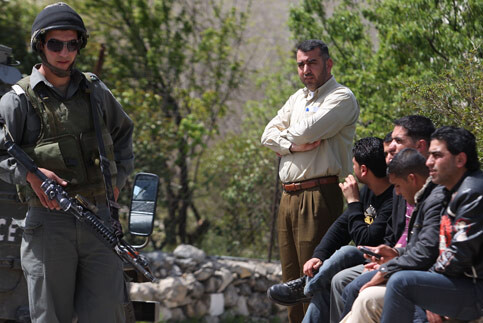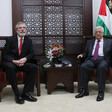The Electronic Intifada 11 May 2009

“There is no such thing as a power struggle while under occupation.” (Mamoun Wazwaz/MaanImages)
The recent Israeli actions in Gaza demonstrated not only the brutal nature of the occupation and the ideology behind it, but also the deep internal division within the Palestinian body politic. It was already common knowledge that Israel had effectively ended the ceasefire on 4 November with an attack that left six members of Hamas dead. Yet, as pictures of dead, dying and wounded Palestinian police cadets flashed through the world’s television screens, Palestinian Authority President Mahmoud Abbas was busy toeing the Israeli line that Hamas was responsible for the ending of ceasefire. He said this, not because it was true, but as a way of undermining the political authority of Hamas in Gaza and increasing his own. Ordinary Palestinians saw through the quite crude and transparent attempt, forcing Abbas to backtrack on his earlier assertion.
The now un-mandated Palestinian president has overseen a situation where his political legitimacy rests, not on his acceptance by the Palestinian people, but on his acceptance by Israel and the West as “a man we can do business with.” Of course they mean business on their terms, not on terms that will bring about a lasting peace but on terms that will preserve Israeli hegemony and reinforce the notion among Palestinians that they are a defeated people. Coming from Ireland and understanding the nature of conflict resolution in the case of the Irish peace process, it is clear that peace is not achieved on such terms. Without justice there can be no peace.
Peace is sometimes defined as an absence of conflict. However, I would define it as an absence of injustice. In the years leading up to the Good Friday Agreement in 1998, the British government approached the concept of peace in the narrow terms of defeating and undermining armed resistance, primarily by the Irish Republican Army, against the British occupation of Ireland. For them, armed resistance was a direct challenge to their position of dominance and privilege.
The Good Friday Agreement was not the first attempt to end conflict in the north of Ireland. The Sunningdale and Anglo-Irish Agreements in the 1970s and ’80s respectively were attempts to end conflict but also to preserve the status quo position of dominance and privilege. There was no acceptance that the armed conflict was the inevitable manifestation of the political conditions in which Nationalist Republicans found themselves. The institutionalized discrimination in areas such as jobs and housing were still a daily reality. In addition, there were concerted attempts to treat the situation in the north of Ireland as a simple security situation that could be defeated militarily. The aim was to reinforce in the minds of Irish Republicans that they were a defeated people. However, the resistance, both politically and militarily, continued against the politics of occupation, subjugation and discrimination until the more recent peace process began.
These days, the north of Ireland is a much different place than the “Protestant Parliament for a Protestant People.” One Party Unionist rule in the interests of the British State is gone. The sectarian Royal Ulster Constabulary police force is gone and the British soldiers are no longer on the streets. The days of British Unionist domination over the Irish Nationalist community are gone and they are not coming back.
Although the peace process in Ireland still has a long road ahead in achieving its core political objectives from a Nationalist and Republican perspective, it is moving forward in the right direction. In contrast, the so-called Israeli-Palestinian “peace process” based on the Oslo accords of the mid-’90s and the more recent attempt to resuscitate it at the 2007 Annapolis conference has been an unmitigated disaster for Palestinians. The difference is clear. Israel’s military occupation continues: the settlement-building, apartheid roads, the wall in the West Bank and army checkpoints continue to harass and oppress Palestinians more than ever before. Meanwhile, the Palestinian people are still subject to arbitrary arrest, deportation, internment without charge or trial and murder by the occupation forces contrary to every semblance of international law. The only “facts on the ground” in Palestine are those illegally imposed by Israel, once again in violation of international law, but also against the spirit of any viable process of genuine conflict resolution.
What is clear is that the road to a free Palestine is a long and arduous one. In terms of all of us who want justice for the Palestinian people, it is of vital importance that we redouble our collective efforts to work for this aim. One of the main differences between previous peace processes in Ireland and the most recent one was the formation of a united front on the part of Nationalist Ireland. The Irish Government, Sinn Fein and the Social Democratic and Labor Party formed a strategic alliance during the negotiations. This was of vital importance to the successful resolution of the talks in the years after. What was also of vital importance was the international aspect of the process. We were able to utilize the strength of the Irish Diaspora in the United States to act as a bulwark to those in the British establishment who were opposed to change. What this achieved was to take ownership of the process away from those who were direct participants to the conflict.
But this did not happen by accident. The political strength of the Irish lobby in America was built up over decades of activism at a time when successive US presidents and their administrations were close to the British. Although the Israel lobby is much more powerful than the British version we found ourselves dealing with, the principles for building political strength internationally are similar. Palestinian society itself has among its number some of the most highly educated individuals available. Also, the history of Palestine, tragic though it is, has provided the opportunity to utilize the sizable Diaspora communities in many countries around the world. The attack on Gaza and the public reaction throughout the world demonstrated the existence of an international activist base that has the potential to bring about real and genuine momentum in the struggle for a free Palestine if developed and used to bring pressure on the governments who ignored the protests and absolved themselves of any responsibility to implement any of the international legal and human rights standards that they themselves have signed up to in relation to Israel and its treatment of the Palestinians.
However, in order to maximize political strength, there is also a need for political and strategic unity on the part of Palestinian and international solidarity activists. It would be an obvious assumption that this unity must begin in Palestine itself. In order to have the widest possible section of Palestinian society represented, it is vital that all mandates as expressed by the Palestinian people are respected.
There is no such thing as a power struggle while under occupation. Does the Palestinian minister for tourism have more power to decide tourism policy in the West Bank or Gaza than an Israeli army chief of staff who decides that “security considerations” are paramount? Can a Palestinian minister with responsibility for natural resources preserve water resources whenever the Israeli government decides that the water should be used for the settlements? National self-determination for Palestine will not come from the “power struggle” between Fatah and Hamas. It will come from the ending once and for all of the occupation. This must be the focus in the time ahead.
Ken Foley is from Ireland and is a member of the Ireland Palestine Solidarity Campaign in Dublin and also a member of Sinn Fein. The views expressed in this article are his own.


